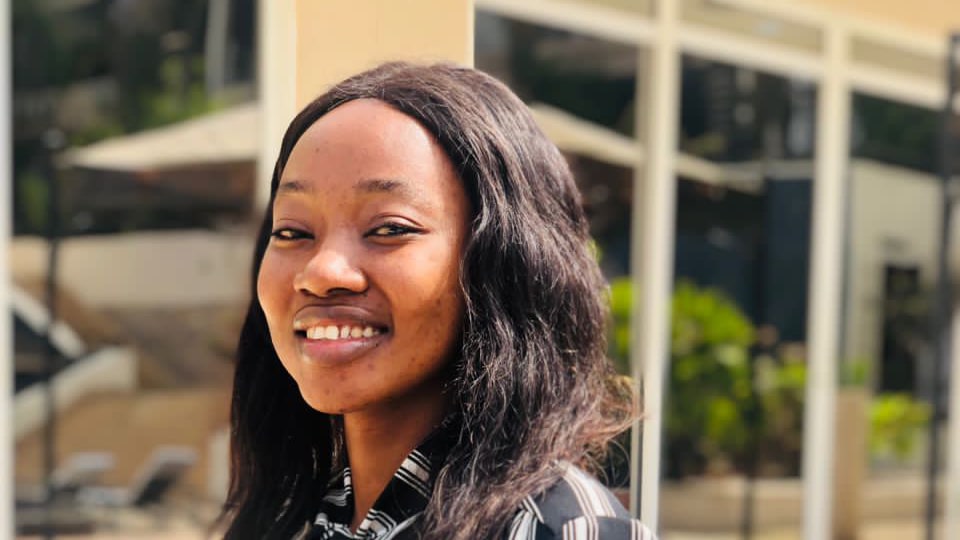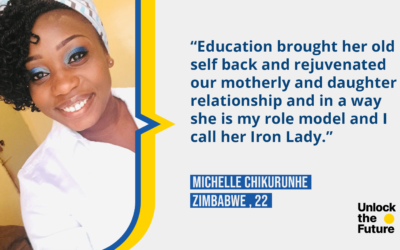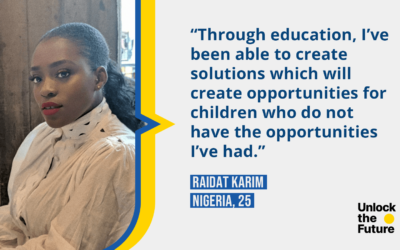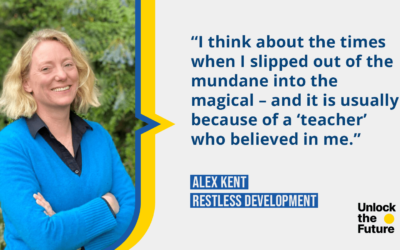“A person’s life can be improved by education. It is likely the most crucial instrument for altering one’s life.“

My name is Sia Christiana Nyandemoh. I was a volunteer in 2014 during the Ebola Surge in Sierra Leone. I then served as Field Lead in Every Adolescent Girls Empowered and Resilient (EAGER) project and presently I am serving as Programme Field Officer in the same project. I hold a degree in Human Resources Management from the University of Makeni. Currently, I am pursuing a Masters Degree in Leadership and Governance. I think I have a young dynamic and energetic personality, prioritizing development and ensuring quality to attain desired results. I have inspired other young people to take leadership roles in the development of their communities.
What inspired you to advocate for education?
I value education much because of what it allows me to do as a young person. I was incredibly motivated to join the EAGER team in order to help these adolescent girls who have never attended school or who left at stage 2 or stage 3, teach them the fundamentals of literacy and numeracy as well as life and business skills, empowering them to take charge of their own development in these communities.
Since the project’s inception, I have assisted many girls in these communities who had never attended school. With our assistance in giving them lessons, many of them can now spell and write their names and perform simple calculations, which will help them when they start their petty trading businesses in these communities. Young girls in isolated areas in Sierra Leone are particularly susceptible because they lack knowledge about their sexual and reproductive health and the ability to make educated decisions in their homes and communities. But when girls in rural regions are educated, they are better able to make informed decisions about their sexual and reproductive health and rights, as well as participate actively in decision-making for themselves and their communities.
What is one personal story that reflects the impact education has had on your life, or the life of someone you know?
A person’s life can be improved by education. It is likely the most crucial instrument for altering one’s life. Education helps people effectively communicate their opinions, enhances information and skills, while also fostering personality and attitude growth. Education helps many disadvantaged individuals live better lives, whereas people who lack education are likely to have a very difficult time finding employment.
A person’s life can be improved by education. It is likely the most crucial instrument for altering one’s life.
There are so many ways that education has impacted my life. My current situation has changed as a result of being a graduate with a Bachelor’s degree in Human Resources Management from the University of Makeni, and the Masters Degree I’m presently pursuing,
If I hadn’t gone to school, I wouldn’t have been a part of the team supporting these young women in these isolated villages as part of the EAGER initiative. During the execution of this project, I have had the opportunity to travel purely for educational purposes.
I was raised in the Koidu City, Kono District and Freetown but I had to relocate for my schooling. Bombali has since become a second home, and I’m now employed in Koinadugu. I have collaborated with a variety of stakeholders and participated in a variety of strategic discussions with the community’s top decision-makers. All of this is taking place just as a result of how education has affected my life. At my age, I assist my family each month with food expenses because of the impacts education has had on my life.
What is the biggest challenge facing young learners now, and what can we do to address the crisis?
In response to these two questions, I only want to reaffirm that there are many issues that require immediate attention since they restrict the learning opportunities for our young students in these communities.
First of all, one of the major problems that most of our young Learners in these communities face is that it is so challenging for development partners to reach rural villages due to the poor road network, our young learners in these communities lack access to high-quality teaching materials. For instance, in the majority of the areas where we are now working on our educational project, some of the people are experiencing these chances for the first time.
The physical structure of educational institutions is the second thing we examine. Not all young learners in these communities want to continue with formal education; some may prefer to further their education by taking other courses like tailoring, carpentry workshop, shop making, etc., but the facility is not available to them so they find it extremely difficult to fulfill such dreams.
Thirdly, young learners lack qualified teachers simply because most qualified teachers are searching for lucrative jobs because the teaching profession does not pay well. As a result, they leave the classrooms to work in ministries or non-profit organizations where pay is higher. When this happens, these young learners are left without teachers, which can cause the majority of them to drop out of school.
What can we do to address the crisis?
We must supply our young learners with the essential learning resources so that while they are learning anything, they may refer to it and see a physical diagram in the student’s book in order to handle the first crisis.
Second, we must make sure that there are physical learning facilities in the majority of these communities to help prevent dropouts among our young learners who must travel far to reach learning facilities or who must leave their gated community for a larger town or city to reach educational institutions.
In order for our teachers to remain in the classrooms and deliver the information on behalf to our young learners in these communities, we must make sure they are actually paid high wages and receive some remote allowances. If they are paid well and content with the terms of the employment, they won’t leave the classroom in search of another career.
All 17 Goals will be reviewed during the SDG Summit in 2023, the largest global moment since the launch of the 2030 Agenda eight years ago. What is your advice to education leaders and young people preparing for post-TES mobilization?
Looking at the 17 goals for 2030, goal 4 has caught my attention the most since it addresses the hot button issue of high-quality education.
If we are to work toward the SDG 4, which includes both formal and non-formal education, the leaders in education must make sure we can handle the concerns I raised earlier.
My advice to our education leaders is to take into account the learning materials, the learning physical structures, and giving lucrative salaries to teachers. Because if all those areas are addressed, we will be working toward achieving quality education for all categories of people in our communities, ensuring that all children including those with disabilities are able to go back to school. Our education programs seek to guarantee that all kids, including those with impairments, can attend school.
If we want to solve the issue of quality education, my fellow young people need to convey some of the issues to our educational leaders. Let our young people speak out strongly about the problems that our young learners are experiencing in these communities so that a quick fix may be given. They must work hard to make sure that they materialize on that day. Inform the decision-makers in the education field on the actual state of education in these remote places.
Let our young people speak out strongly about the problems that our young learners are experiencing in these communities
Who is your superhero that you admire and why?
My father is my superhero, and I love him so much for always letting me take the initiative. He only acts as a guide for my actions. He always gives me the go-ahead to carry out my suggestions, and he stands by to encourage and advise me along the way. He is incredibly encouraging and always pushes me to make school my first focus.
He is the sort of person that values education highly and is constantly available to encourage me when I want to study. He was the first to genuinely teach me the value of an advocate. I looked up to him as a mentor and role model because he showed me how crucial it is to speak up for those with less privilege or vulnerable girls.
Because he did not want me to become a victim of an early pregnancy, my father is the sort of person who is always there to provide me sex education. When I joined the Restless Development organization, they genuinely helped me shape my own life, which is why I am a young educated woman today. Dad is always my superhero and the person I most adore since he performed important roles in my life. He knows what being a homeless person means because he once lived as one.
Sia on Twitter: @NyandemohSia


